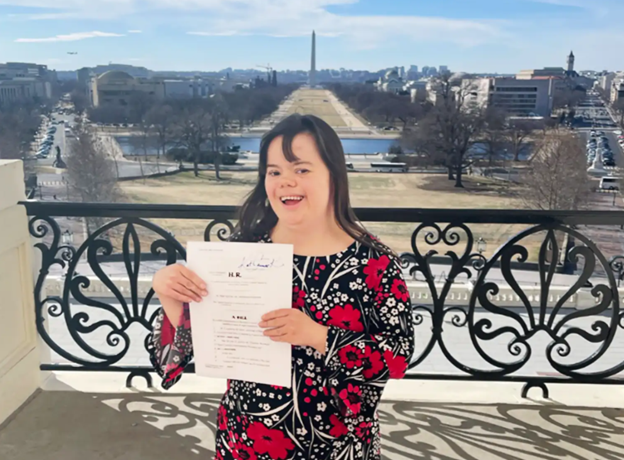FROM THE STACKS
EDITOR’S NOTE: There are literally thousands of journals published around the world that relate to the disability community. It is virtually impossible to capture even a fraction of them. HELEN receives "stacks" of journals and selectively earmarks what we feel are "must read" articles of interest for our readers. It's a HELEN perk!
House Passes Charlotte Woodward Organ Transplant Discrimination Prevention Act
On June 23, the U.S. House of Representatives passed the Charlotte Woodward Organ Transplant Discrimination Prevention Act! The bipartisan bill is named after Charlotte Woodward, a woman with Down syndrome and NDSS (National Down Syndrome Society) staff member who received a lifesaving heart transplant over 13 years ago. “Charlotte’s Bill” prohibits discrimination against people with disabilities in the organ transplant system by upholding, clarifying, and building upon rights established in existing civil rights legislation.
The focus now shifts to the Senate, where it is important to continue building support for Charlotte’s bill. We need YOU to make your voice heard and use our Action Alert to tell your Senators to support Charlotte’s Bill!
URGENT! Take action on the Charlotte Woodward Organ Transplant Discrimination Prevention Act!
Aging, Disability, and Mental Health: Historic and International Politics and Policy in Times of Change
By Michael J Lepore, PhD, FGSA
Public Policy & Aging Report, Volume 35, Issue 2, 2025, Pages 35 36, https://doi.org/10.1093/ppar/praf009
Published: 30 June 2025
PDF Cite Permissions Icon Permissions
Periods of rapid societal change, including both revolutionary and reactionary shifts to transform the structures of society, occur intermittently throughout national and international histories. Even short-lived turbulent historical periods often have long-lasting impacts, shaping culture, the creation and dissolution of social structures, including government institutions, and the enactment and repeal of public policies. This issue of Public Policy and Aging Report grapples with policy concerns related to population aging, disability, and mental health in a variety of current international contexts; brief accounts of some earlier historic periods of policy transformation and structural change set the stage for the articles in this issue.
The United States established its major social and health insurance programs primarily financed by payroll taxes—for example, Social Security, Medicare, Medicaid—in alignment with other policies and significant political shifts of their respective eras. The Social Security Act of 1935 was core to Franklin D. Roosevelt’s New Deal for Americans recovering from the Great Depression. Beyond providing short-term economic relief, it established the Social Security Administration, which has continued to provide protection to workers in old age. Concurrently, the National Labor Relations Act of 1935 expanded union rights for workers. Thirty years later, the Civil Rights movement—pushing the country through the post-Civil War Jim Crow era—motivated Lyndon B. Johnson to sign into law the Voting Rights Act of 1965. The same year saw the passage of the Social Security Amendments of 1965 (the Medicare and Medicaid Act) and the Older Americans Act (OAA) of 1965. Stitched together these programs created the American safety net of supports for older people and people with disabilities. Drs. Joe Caldwell and Joshua Gladstone (2025) of The Lurie Institute for Disability Policy at Brandeis University carry this story forward into the twenty-first century by detailing how the Patient Protection and Affordable Care Act (ACA) of 2010 not only built on twentieth-century aging policy foundations by expanding Medicaid eligibility but also advanced major structural changes such as establishing the Administration for Community Living (ACL), which brought together the previously separate Administration on Aging, Office on Disability, and Administration on Developmental Disabilities into one federal office.
Within weeks of Donald J. Trump’s second inauguration, sweeping changes across the federal branches of government brought about significant shifts in public policy and social structures. Efforts toward complete transformation of the federal government were announced with executive orders from the Trump The White House (2025, 2025a) calling for “transformation of the Federal bureaucracy” and “transformation in Federal spending on contracts, grants, and loans.” Major societal changes advanced included rapid and severe shrinkage of the federal workforce; eradication of efforts promoting diversity, equity, and inclusion (The White House, 2025b); the cancellation of hundreds of millions of dollars in federal grants and contracts, including support for public health activities and medical research; and the decimation of numerous federal departments and agencies such as the United States Agency for International Development, the Department of Education, and ACL.
The broad scope and transformative intent of changes to American public policy and social structures launched in 2025 may be perceived as weakening the nation (GSA, 2025), but new national leadership seeking transformation is not unprecedented globally. Following the founding of the People’s Republic of China (PRC) in 1949, the PRC’s first leader, Mao Zedong, also launched drastic changes, the Great Proletarian Cultural Revolution, which included a Socialist Education Movement and a concerted attack on the “Four Olds” (old customs, cultures, habits, and ideas) (Merwin, 1970), as well as the decentralization of healthcare authority and dispersion of paramedics (i.e., “barefoot doctors”) into local communities focused on rural areas (Cook & Dummer, 2004), and many other changes to culture, public policies, and social structures. These grand changes reverberate in twenty-first-century China, including via policy and practice changes continuing to seek advances in health and well-being for older persons in rural China. Dr. Qiushi Feng at the National University of Singapore and Dr. Danan Gu (2025) review China’s National Toilet Revolution Initiative, which is enhancing access to modern toilets, and highlight its efforts to ensure inclusivity of older adults in a political context where, since the 1980s, China has successfully encouraged urbanization, and rural China has experienced greater population aging.
Recognizing the historic influence of national politics and social structures is instructive for considering opportunities and challenges in societal approaches to aging. Although changes to policy are not easily predicted, they can be prefigured or at least foreshadowed. Dr. Emmanuel Gonzalez-Bautista, Delfina Álvarez, and Drs. Patricia Morsch and Enrique Vega (2025) of the Pan American Health Organization (PAHO) provide a vision for policy and practice innovations to enhance integrated and person-centered care in the Americas, elucidating the potential for new models of care and support to extend beyond the health sector and address broader health-related needs over the life course. By contributing “a vision for bridging policy gaps in integrated, older-person-centered care and aligning healthcare with user needs under a life course approach,” the PAHO authors demonstrate meaningful ways forward toward the establishment of multisectoral integration at large national or even regional scales that considers not only the size but also the needs of aging populations.
The push for multisectoral integration in care and support systems underpins recommendations for mental health interventions and policy, building on recent societal advances to support social connection and address loneliness and isolation. Dr. Liming Li (2025) describes international attention to these issues, including changes to policies focused on loneliness, social isolation, and social connection as well as the development of new societal roles, such as the appointment of “ministers of loneliness” in the United Kingdom and in Japan. Recent research showing the association of loneliness with right-wing extremism (Peterson et al., 2025) lends weight to the timeliness of grappling with this issue.
The importance of data for informing policy efforts to support social connection and to combat loneliness is addressed by Dr. Deb Bibbins. Dr. Bibbins is the founder of For All Ages, an organization established to “end loneliness and isolation, shift norms and outcomes for older adults, and improve the mental, physical, and social health of all people of all ages” (For All Ages, no date). While some community-based organizations and states have implemented campaigns to advance public awareness of loneliness and to foster social connection, Bibbins (2025) emphasizes the important role of data to inform these efforts: “This important work would be enhanced through some collection of community-level data to demonstrate the true scale of loneliness, encourage funding for community programming, and enable a shift toward more comprehensive public policy strategies aimed at strengthening the social connections that are foundational to overall health.” Recent reductions in access to federal data (Cox et al., 2025) suggest the need for trustworthy data on loneliness.
As US structures, policies, and international relations undergo significant transformation in the early months of President Trump’s second term, scholars of public policy and aging are increasingly concerned about the long-term impacts on older adults’ health, well-being, and access to high-quality supports and services. By attending to policy developments internationally and historically, this issue of Public Policy and Aging Report offers a broad lens for considering current and pending changes to public policy and social structures and informing the development of new policies and structures in the decades ahead.
Funding: None.
Conflict of Interest: None.
References
Bibbins,D. (2025).
Improving community-level data on loneliness and social connectedness: A vital step in addressing the public health crisis of loneliness in the United States
Public Policy & Aging Report, 35
praf007. https://doi.org/
10.193/ppar/praf007 Google Scholar WorldCat Crossref
Caldwell, J., & Gladstone, J. (2025).
Bridging aging and disability networks to support aging adults with intellectual and developmental disabilities and family caregivers
Public Policy & Aging Report
.https://doi.org/10.193/ppar/praf003
Google Scholar WorldCat Crossref
Cook, I. G., & Dummer, T. J. (2004).
Changing health in China: Re-evaluating the epidemiological transition model
Health Policy, https://doi.org/10.1016/j.healthpol.2003.07.005



